Review: 2012 Honda Civic Hybrid

More than just a mere model, the Honda Civic is an institution. With 9 million examples sold on American shores, and nearly 20 million worldwide, calling it “Honda’s most important car” doesn’t express the importance of getting the 2012 redesign right. Michael got his hands on the EX model last May, but today we’re looking at the green poster child of the Honda line-up. Visit TTAC next week as we get gaseous with the Civic CNG.
If the Civic were a brand, it’s volume would rank above the likes of BMW, Mazda, Mercedes and Chrysler. As you would expect from a volume player, Honda played it safe with the sheetmetal. While overall proportions are exactly the same as the 2011 Civic, the 2012 sports a 1.2-inch shorter wheelbase. The hybrid’s new nose sports a grille with horizontal bars, chrome bling and blue trim to show that the planet is being saved. The overall look is evolutionary and elegant, a logical move for the Civic as the hybrid model can cost more than $27,000 after destination charges. Aside from the subtle blue band up front, a hybrid logo and LED brake lamps out back, there are no visual clues to the Civic’s powertrain.
Exterior
If you thought the Civic was small , then you haven’t been inside one recently. Interior volume is up by four cubic feet and rear leg room has grown by nearly two inches. Four average sized Americans will have no problem spending time in the Civic, but 5 is still a tight squeeze. Honda’s redesigned battery means trunk room has grown slightly from 10.4 cubic feet to 10.7, but still a notable reduction from the non-hybrid’s 12.5 cubic foot trunk. The battery is still located behind the rear seat meaning the seat backs can’t fold for longer cargo.
The Civic’s interior continues to feature Honda’s “two-tier dash” which places a digital-style speedometer, MPG and fuel gauge high on the dash. Next to the them is a high-resolution 5-inch LCD “Multi-Information Display” (i-MID) which displays hybrid system, audio, trip and fuel-economy information. The lower tier has the tachometer and warning lights and is behind the steering wheel. The cockpit continues to be driver-oriented with the HVAC and radio controls angled towards the driver.
Interior
As the Hybrid shares its interior with the Civic Coupe (starting at $15,755), plastics are hard and the texturing does little to disguise it. In truth, most of the competition isn’t any better, but that’s not to say we can totally excuse some items. Our tester’s passenger-side airbag color was a distinctly different shade than the surrounding dash, a problem we also noted on the Civic Natural Gas tester. Front seat comfort is excellent for long trips, but as Honda continues to put fairly exaggerated fixed lumbar support in the Civic ‘s front seats, (something I personally prefer) you might want to spend some time sitting in the seats before you buy. Rear seat cushions continue to be positioned low in the Civic making longer journeys tiresome for your long-legged friends, but your kids will be happier with seats that start lower to the floor.
Infotainment
Since the Civic Hybrid is essentially the flagship Civic, all models come standard with Honda’s 6-speaker, 160-watt sound system independent of the head unit. Base models come with an MP3 CD player that and basic a USB/iPod interface. The optional navigation system adds a large screen for navigating your “iDevices” as well as XM Satelite Radio with XM Nav Traffic. The system’s interface is logical and well laid out, but the graphics are not as nice as Toyota’s or Ford’s systems. Although you cannot voice command specific tracks from your iPod like you can in Acura or Ford products, practically every other command in the system is “voice commandable.” The $1,300 premium to step up to the nav system is a tough pill to swallow when after market systems deliver a more pleasing interface for less.
Drivetrain/Tech
With little fanfare Honda has significantly updated the “Integrated Motor Assist,” or IMA hybrid system. At the heart of the fifth-generation system is a larger 1.5L engine.Although larger than last year’s 1.3L unit, the displacement increase doesn’t improve power, which falls by 3HP. The biggest change is a revised torque curve for more efficient driving. As before, the electric motor is sandwiched between the engine and a traditional CVT. The new motor is not only more powerful, bringing 23HP and 78lb-ft to the party, but it’s also smaller and lighter than before. With Toyota’s hybrid synergy drive you can’t add “engine+motor” to get total system figures, but with IMA you can. Because the torque and HP curves of the motor and engine differ, the maximum output is where the two lines intersect: 110HP at 5,500RPM and 127lb-ft of torque from 1,000-3,500RPM. (Thank the electric motor for that flat torque curve). Also new to this system is a dual-scroll A/C compressor, first seen in the defunct Accord Hybrid. The new compressor is a huge improvement for the Civic because the A/C can now run with the engine off, improving city MPGs.
Powering the electric motor is an all-new lithium-ion battery and new control circuitry that is 35% more efficient than before. Although the battery’s capacity has gone down (from 5.5Ah to 4.7Ah), lithium batteries can charge and discharge more quickly, allowing the 2012 Civic Hybrid to recapture more energy from regenerative braking as well as roll around in EV-only mode. Yep, this Civic can now cruise around solely with electric power – for short periods of time. Since Honda doesn’t use a clutch to disconnect the engine from the motor (ala Infiniti’s M35h or Hyundai’s Sonata Hybrid), the engine is always turning. Even during 100% electric mode. If you are driving around town, on a flat road, under moderate throttle and speeds under 40MPH, the Civic Hybrid will close the engine’s valves, cut off the gasoline and the 23HP provides all the power to spin the wheels, and the engine. Since the tachometer is still reading motion, the only way you know you’re in EV mode is by looking at the i-MID screen.
Drive
Since the motor delivers all of its 78lb-ft at low RPMs, off the line shove is better than the numbers might suggest. Not all is perfect with the latest IMA system however as transitions between regenerative and regular braking are considerably less polished than in Toyota’s hybrid products, especially when the battery reaches capacity. On the bright side, the CVT and the broad torque curve also turn the Civic Hybrid into a fairly effective hill climber. The Civic Si is incredibly satisfying on a windy mountain road and I would like to say the same could be said of the Hybrid, but I would be lying. When the going gets twisty, the low rolling resistance tires howl and give up early and extend braking distances significantly. Still, road holding isn’t what hybrids are about. Fuel economy is the name of this game.
As I am sure you’ve all heard, the previous generations of Civic Hybrid have had some bad press over fuel economy. Honda obviously took their recent legal woes to heart and not only improved the EPA numbers on the Civic Hybrid, but seemingly the real world mileage as well. EPA economy is up from 40/43 to 44/44 and in our week with the car we averaged a respectable 42.8MPG over 889 miles. Before you comment on the difference between EPA and observed economy however, this was not a typical commute week for me. Instead of my blend of mountain/city/highway driving, the Civic spent the majority of the week going up and down a 2,200ft mountain pass with little highway time. Still, this included the 2012 Hybrid scored better than the 2011 I tested previously, which averaged 36MPG.
How much does Honda’s compact fuel sipper cost?Pricing is easy, and there are only four ways to buy your Civic Hybrid. $24,200 buys the base model with cloth seats, $25,700 adds navigation, $25,400 gets you the base Hybrid with leather and our tester was the $26,900 model with navigation and leather. That’s about $3,500 more than a comparably equipped Civic EX, not to mention pricier than the Insight. For those paying attention, that’s just about the same as a Prius when you adjust for the extra features in a Prius “Four.” If your goal is simply to burn less gasoline, then the Prius is the green car for you. If however you’re looking for something more traditional that is “green enough,” the Civic Hybrid fits the bill perfectly. Of course, there’s still the question of the Insight. Although leather isn’t available, the most expensive Insight (EX with navigation) is $510 less than the Civic. Although the Civic Hybrid is slightly faster and handles slightly better than the Insight, it’s easy to see why the Civic Hybrid has remained, and is destined to remain a slow seller in America.
Honda provided the vehicle, insurance and one tank of gas for this review
Specifications as tested
0-30: 3.95 Seconds
0-60: 10.2 Seconds
1/4 Mile: 17.6 @ 79.5 MPH
Average fuel economy: 42.8MPG over 889 Miles

More by Alex L. Dykes
Latest Car Reviews
Read moreLatest Product Reviews
Read moreRecent Comments
- Jeff I do think this is a good thing. Teaching salespeople how to interact with the customer and teaching them some of the features and technical stuff of the vehicles is important.
- MKizzy If Tesla stops maintaining and expanding the Superchargers at current levels, imagine the chaos as more EV owners with high expectations visit crowded and no longer reliable Superchargers.It feels like at this point, Musk is nearly bored enough with Tesla and EVs in general to literally take his ball and going home.
- Incog99 I bought a brand new 4 on the floor 240SX coupe in 1989 in pearl green. I drove it almost 200k miles, put in a killer sound system and never wish I sold it. I graduated to an Infiniti Q45 next and that tank was amazing.
- CanadaCraig As an aside... you are so incredibly vulnerable as you're sitting there WAITING for you EV to charge. It freaks me out.
- Wjtinfwb My local Ford dealer would be better served if the entire facility was AI. At least AI won't be openly hostile and confrontational to your basic requests when making or servicing you 50k plus investment and maybe would return a phone call or two.



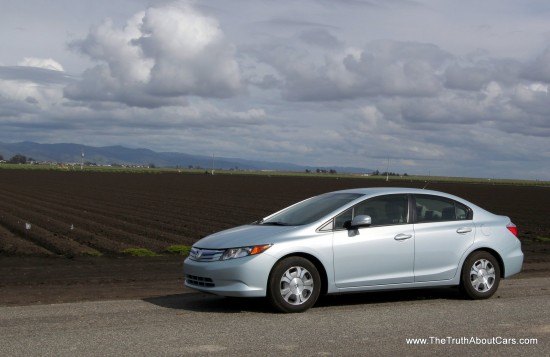



























































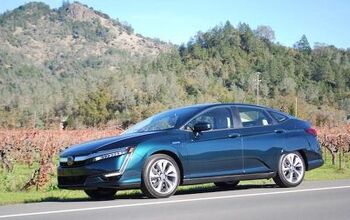
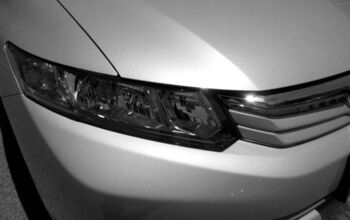

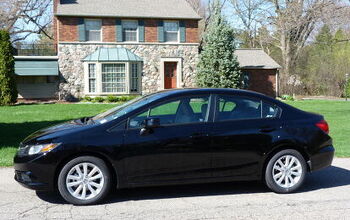
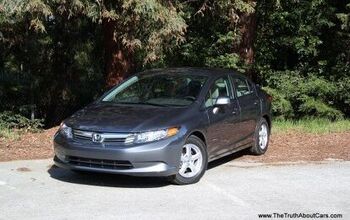

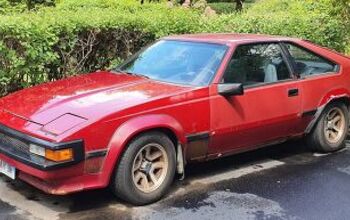


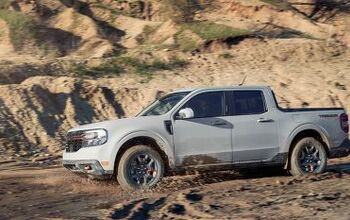





Comments
Join the conversation
The one thing I can give Honda here is this hybrid doesn't jump out and scream 'I'm pretentious'.
This is a little off topic, but . . . Michael, are you or anyone at TTAC going to be doing a review of the updated 2012 Honda Fit, particularly in the Sport trim?